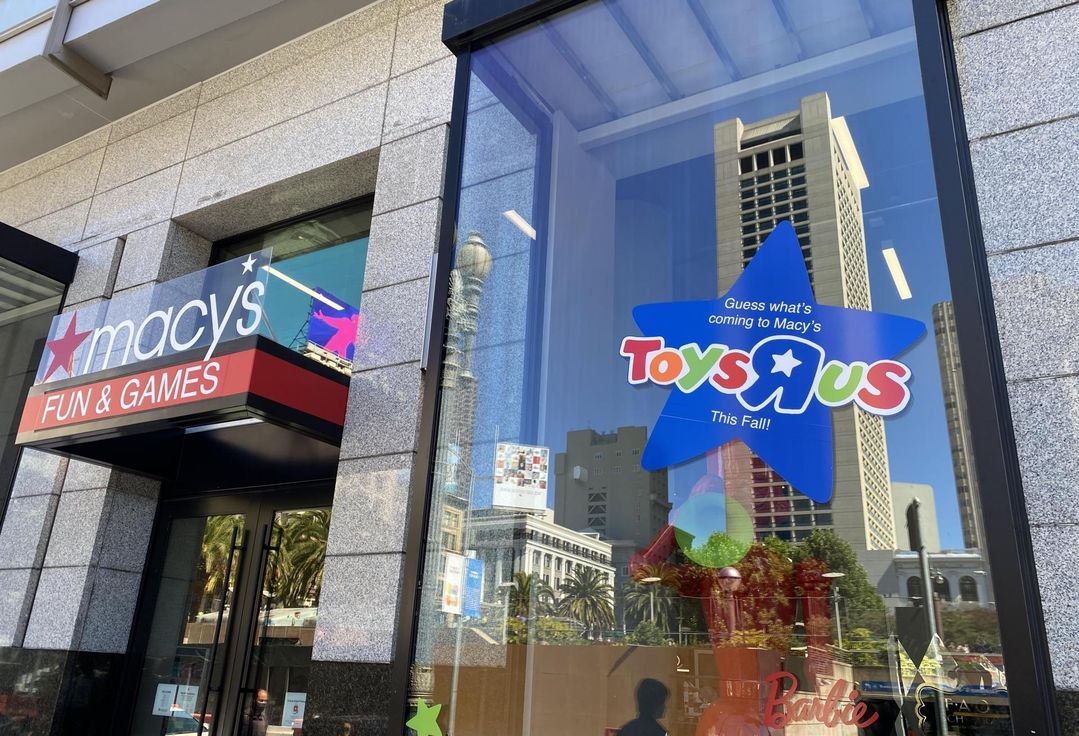
Store-In-A-Store Concept Part Of Retail’s ‘Grand Experiment’
There’s safety in numbers, as the old adage goes. The concept of banding together to avoid harm is well-worn and logical, which is perhaps why a growing cadre of big-name American retailers are joining forces to better weather an unfavorable economic climate characterized by rapid growth in e-commerce, historic inflation and flagging consumer spending.
The most recent example is the move by WHP Global, which owns the Toys R Us brand following the toy giant’s collapse in 2018, to open locations within Macy’s department stores across the U.S. The openings began this month and will continue through October, getting new rows of toy offerings into stores just in time for holiday shopping.
“We don’t have any toy stores, right? If there is ever an opportunity for a partnership that will allow for foot traffic to come in, particularly during times of Christmas, I think this is that partnership,” said Gautham Vadakkepatt, director of the Center for Retail Transformation and associate professor of marketing at the George Mason University School of Business.
The move gives Toys R Us physical stores in prominent locations and diversifies Macy’s offerings by adding between 1K SF and 10K SF of toys and collectibles to the store’s racks of clothing and stacks of housewares.
While Macy’s managed to stave off bankruptcy in 2020, it is still troubled financially and has announced store closures and a three-year plan to restructure its finances.
During the company’s Q1 earnings call, Chief Financial Officer Adrian Mitchell said Macy’s has made strides with less bad debt and higher credit card sales, but it expects inflation to serve as a negative counterbalance to those recent improvements.
“While credit card revenues exceeded our expectations for the quarter, we continued to expect inflation to outpace wage growth and weigh on consumer health,” he said. “We expect this to contribute to an increase in bad debt.”
The company’s partnership with Toys R Us, announced in 2021, has given Macy’s a much-needed boost in the toy department according to company leadership. Toys R Us products have been available through Macy’s website since last year.
Macy’s first tinkered with the “store-within-a-store” concept in 2019, launching a “narrative-driven retail experience” called “Story” in 36 of its locations, offering gift products in carved-out sections of its stores that would “give new customers a reason to visit our stores,” CEO Jeff Gennette said at the time.
Macy’s and Toys R Us aren’t alone. Others that have gotten in on the store-within-a-store trend include Ulta and Target, Sephora and Kohl’s, and Claire’s and Walmart.
Youth accessory brand and mall stalwart Claire’s filed a prospectus to go public in 2021, three years after emerging from Chapter 11 bankruptcy. The IPO was expected to bring an infusion of capital that the brand would use to expand its presence outside of malls. Some of these locations can be found within Walmarts, allowing Claire’s to access the massive foot traffic that Walmarts see every day, and providing Walmart with a familiar destination for children and teens seeking new jewelry or even an ear piercing.
Placeholder
Walmart
The success or failure of these kinds of ventures depends entirely on the execution, Vadakkepatt said.
“It’s a partnership that adds value to the customer base that has potential to draw consumers into the store who might never have walked through the store,” he said. “It’s about the experience — how well do they execute this, how well do they allocate resources to make it succeed and what’s the marketing communications around it?”
And while the store-in-a-store trend pre-dates the pandemic, the new realities forced on retailers since 2020 clearly play a part in how companies think about their real estate strategies.
“The pandemic has kind of put the spotlight on partnerships, unique ways to add value,” Vadakkepatt said. “You’ve seen this escalation where retailers are trying to figure out: How do they partner? And it’s a real estate play too, right? You’re able to lease out the property in some ways to generate additional revenue,” he added.
Colliers National Director of Retail Services Anjee Solanki believes the partnership aspect will be important for retailers for the foreseeable future, as external stressors such as inflation force retailers to pivot to operate more efficiently.
“We have roughly 20% of retailers that do not have the workforce to maintain their stores, services, etc. And we have had such a significant volume of people coming back to brick-and-mortar post-pandemic, but nonetheless, retailers are trying to be highly efficient,” she said.
For the smaller chains posting up in a larger store, one of the biggest benefits comes in the form of lower operating costs compared to a standalone retail space, without losing coveted brand awareness.
“There’s a lot of cost savings — your build-out costs, your costs associated with paying triple-nets, etc.,” she said. “If I were to open 30 standalone stores in a year, versus having maybe 50 stores-within-stores, there’s going to be significant cost savings.”
Solanki predicted that the evolving nature of brick-and-mortar in retail is going to lead to a lot more experimentation as retailers re-evaluate their respective needs. She also said that in a sense, the store-in-a-store concept is almost a return to the larger department store formats of yesteryear, with the actual retail space becoming less of a concern, and the overall branding and consumer experience becoming what retailers prioritize.
“Right now, retail is in this grand experiment. And I think that is really important, whether it’s the experiment of store-within-store, or curbside pickup, or these large, you know, towers now in the parking lot that deliver your online purchase, right?” she said.
“You know, it’s no longer about the real estate, it’s really about how brands are building loyalty, based on consumer habits, and taking them through the next new journey,” Solanki added.
Contact Joseph Gordon at joseph.gordon@bisnow.com
Shared from Bisnow

